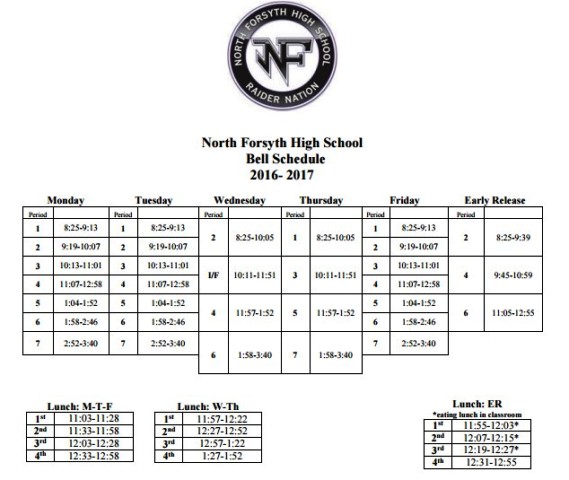Is Our Time Being Used Effectively at School?

Sitting in a class for 90 minutes can get really boring, really fast, but seven periods a day isn’t necessarily good either. What’s the best option?
January 20, 2017
School scheduling has always been a topic of debate, mainly because there is no perfect way of managing a student’s time. North Forsyth High School, if you weren’t already aware, runs off of a mix between a seven period schedule Monday, Tuesday and Friday, and a 4×4 block schedule on Wednesdays and Thursdays. Most schools are using one or the other, as well as additional schedules that may work better. Personally, I’m against our schools scheduling methods, and I believe there are other better ways of organizing classes, each with advantages and disadvantages but all useful in some way.
The seven period schedule is the one that most people are familiar with as it has been used for a very long time. The schedules are made up of the same seven classes every day and usually last somewhere between 45 and 50 minutes. Because of this shorter class time, it’s much harder to grow tired of one class. It makes it easier for teachers to prepare lessons as they don’t need to do as much planning for each class, and they can spread it out more over time. The shorter class periods also make it easier to make up missed classes as less information was covered. Since there are only 7 periods, students lose the opportunity for another elective, which means less time doing something that could be interesting. The other negative is that with seven periods a day there will be more homework from classes that you need to finish that night, as well as the possibility for several tests in one day.
A block schedule is a good way of removing those disadvantages, but being the near opposite of the seven period schedule all the advantages from other schedules turn into disadvantages. There are two types of block schedules, four classes that change every day or four classes that change at the end of the semester. Personally a class change at the end of a semester seems much more appealing, mostly because there is far less work being placed on both students and teachers. However, changing classes at the end of the semester means that information will have a long time to fade before EOCs and AP exams. For the purpose of being optimistic, there are many more advantages of the block schedule then there are downsides. Each period takes longer for teachers to plan, but it is more manageable and less time consuming. The fact that you take eight courses a year means that you can earn more credits for graduation and college, as well as an extra opportunity to learn something you love. There would only be a maximum of four homework assignments a night and there would be a smaller chance of having multiple tests to study for in one day. However, these long classes mean it will be harder to catch up after one day of being absent, and after sitting in a class for around 90 minutes, tasks can begin to seem dull and attention in students can begin to fade near the halfway point.
A subcategory of the seven period schedule is the eight period schedule, which I like more because it tries to take the good aspects of both seven-period and block and fuse them. Class times are shorter to make room for the extra class, which means getting bored or tired should be a lot harder. It also means that there is one more class available for taking, which can mean four more credits by the time you graduate. It makes it a little harder on the teachers though, as the amount of classes they need to prepare for either goes up, or they gain an extra planning period.
There really is no schedule that is better than all the others, so you just need to decide which one would suit your best interests. Again, I don’t like the way our schedule works, and I feel like a more basic one would be better. Our schedule tries to keep the best of all the different types of systems. The question is, does it do it well enough, and what could it do better?



